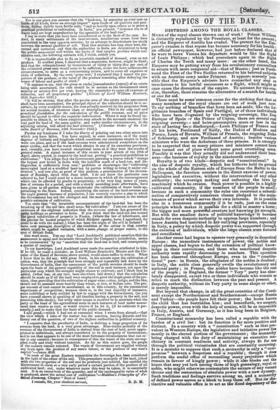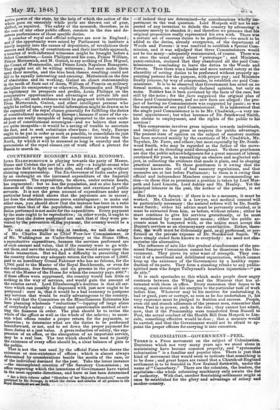TOPICS OF THE DAY.
DISTRESS AMONG THE ROYAL CLASSES.
MORE of the royal classes thrown out of work ! Prince Williara is distinctly repudiated by the Prussians, at least for the present; and the Emperor of Austria has evaded. The pretext for the Etn. peror's evasion is that repose has become necessary for his health an official newspaper, however, had just before declared that if he were to leave Vienna his departure would be like the flight of Louis Philippe ; which had precedents again in the flight of Charles the Tenth and many more : on the other band, the Emperor may be getting away from his revolutionary counsellors to return with more congenial aid—that of Russia ; just as Ferdi- nand the First of the Two Sicilies returned to his beloved subjects with an Austrian army under Frimont. It appears scarcely pos- sible that the Emperor's advisers have counselled any step se treacherous to his lawful successors as a flight, which might at once cause the disruption of the empire. To account for the eva. sbn, therefore, there remains the alternative of a.search for health or one for aid.
There must be some-common cause for the striking fact that so many members of the royal classes are out of work just no To say nothing of branches that have been set aside, like the Le- gitimate branches of Spain and Portiigal, or of those individuals who have been disgraced by the reigning sovereign, like Dori Enrique of Spain or the Prince of Capua, there are several real reigning sovereigi.s and heirs-presumptive more or less in the state of having be( ii discharged,—Louis Philippe of France and all his heirs, Ferdinand of Sicily, the Dukes of Modena and Parma, Louis of Bavaria, William of Prussia, the reigning Duke of Schleswig, and now Ferdinand of Austria ; besides various ministers who were the Achateses of these princes. It is strongly to be suspected that so many princes and ministers cannot have been turned out of place without some great overriding error. Possibly it was that they actually did not understand their busi• ness—the business of royalty in the nineteenth century. Royalty is of two kinds—despotic and "constitutional." In the case of despotic royally, which has hitherto held its ground on the whole of the Eastern side of Europe from the Baltic to the Hellespont, the function consists in the direct exercise of power, legislative and executive, without the intervention of any other authority; the sovereign making and enforcinF the laws by machinery which he creates. Such power is possible in a highly cultivated community, if the numbers of the people be small; because in such a community the ruler can construct a subordi- nation of comparatively numerous classes pledged to the main- tenance of power which serves their own interests. It is possible also in a numerous community if it be rude, just on the same principle which makes it possible for a child to master a horse; the bigger and more powerlfut creature not knowing its strength. But with the smallest dawn of politicannowledge- it becomes unsafe for even despotic authority to oppress large numbers ; and hence Austria bad instituted in her outlying provinces, especially in Italy, a policy by which despotic power was supported through the coercion of individuale, while the kip classes were fostered and conciliated.
Another cause bad begun to operate very generally in despotical Europe : the immediate instruments of power, the nobles and upper classes, had begun to feel the extension of political know- ledge in their convictions, and those who sanctioned despotic authority were rapidly decreasing in numbers. This operation has been observed throughout Europe, even in the " constitu- tional " part: in Russia, the allegiance of the nobles is doubted; in Italy, the noble class generally swells the revolutionary and national party ; in France, the nobles have become like the rest of the people ; in England, the former " Tory" party has abso- lutely disappeared, except two or three individuals who remain as relics to mark the distinction between the past and present. A despotic authority, without its Tory party in some shape or other, is merely impossible.
But beyond that change, in all the great countries of the Conti- nent except the Northernmost and Southernmost—except Russia and Turkey—the people have felt their power ; the horse knows the child that has bestridden him ; and henceforth, we suspect, despotic power, even with the help of armies, will be as impossible in Italy, Austria, and Germany, as it has long been in Belgium, France, or England. Constitutional monarchy has been called a republic with the burden of a civil list : but its function is far more positive and distinct. In a country with a " constitution " such as that pre- valent in Western Europe, the legislative and initiative power lies mostly in the elected portion of the government ; the monarchy being charged with the duty of maintaining an executive ma- chinery in constant readiness and activity, always fit for use through the political vicissitudes that are constantly occurring. It is a mistake to suppose that such a monarchy is only a " com- promise " between a despotism and a republic; though it does perform the useful office of reconciling many prejudices which remain in favour of kingly power ; while it also blocks out the hopes that may yet lurk among those of high genealogy, royal or noble, who might otherwise contemplate the seizure of any vacant throne and the restoration of absolute power with a new dynasty. Such traditions and feelings survive among us, and a monarchy of defined power serves as a block to keep them off. But its tinctive and valuable office is to act as the fixed depository of the active power of the state, by the help of which the action of the whole goes on smoothly while parts are thrown out of gear, shifted, or repaired. The safety of the monarch, therefore, as in the case of any other public officer, consists in the due and de- corous performance of those specific duties. A number of royal and official refugees are now in England ; and if the opportunity were seized by Parliament to institute a timely inquiry into the causes of depositions, of revolutions their success and failure, of constitutions and their inevitable approach, a number of well-informed witnesses might be brought before a Select Committee,—Louis Philippe and his sons, Prince William, Prince Metternich, and M. Guizot, to say nothing of Don Miguel, the Count of Montemolin and Prince Louis Napoleon Bonaparte. They might not all be Willing witnesses ; but once make them open their mouths and the blue book thence resulting could not fail to be equally interesting and amusing. Metternich on the fate of absolutism and its working, Guizot on closet statesmanship in the teeth of facts out of doors, William of Prussia on military discipline its omnipotency or otherwise, Montemolin and Miguel on legitimacy its prospects and profits, ,Louis Philippe on the comparative opportunities and advantages of private life and royal life,—all such evidence would be pregnant with instruction. From Metternich, Guizot, and other intelligent persons who might be called upon very useful information might be drawn as to the capacity of the royal classes generally for fulfilling the duties of constitutional monarchy in Europe ; because if some of the ex- despots are really incapable of being promoted to.the more exalt- ed post of constitutional sovereigns—and we believe that some are quite incapable—it would be a saving of trouble to ascertain the fact, and to seek substitutes elsewhere : for, truly, Europe ought to be put in order as soon as possible, to consolidate its just constitutional power against the reactionary inroads from the North, by which it will be menaced so long as anarchy and the pretensions of the royal classes out of work afford a pretext for Russia to march in.



























 Previous page
Previous page